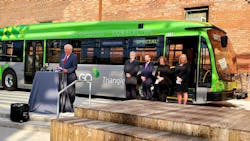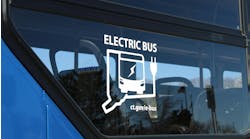GoTriangle delivered on its effort to address rider requests to explore alternative-energy buses with the debut Jan. 7 of the first of two battery-electric buses.
The 40-foot buses are being provided by Proterra, which was awarded a contract in January 2019 for the vehicles. The procurement of the buses was made possible by a $943,000 federal low- or no-emission grant GoTriangle was awarded in 2018.
“We’ve heard from our customers over the past few years that they really wanted GoTriangle to explore using alternative-energy buses, and we are thrilled to have our first two electric buses nearly ready to go,” said Shelley Blake Curran, GoTriangle’s interim CEO and president. “Being more environmentally friendly is just one more way we can better serve our growing region.”
GoTriangle will spend a few weeks training bus operators and mechanics on the electric buses before adding them to its fleet of 74 buses, which carry about 7,000 passengers a day on 13 regional routes and seven express routes.
“With new electric buses rolling through North Carolina, GoTriangle showcases its commitment to sustainability and the promise of innovative partnerships in transportation,” said U.S. Rep. David Price (D-NC-04). “It’s exciting to see these improvements right here in North Carolina as GoTriangle, Duke Energy, Proterra and other partners join together to improve mobility in our region.”
GoTriangle plans to run the electric buses on every route. GoTriangle says the buses travel 21.4 mpg-equivalent at 19 cents a mile while a diesel bus gets 3.86 mpg at 84 cents per mile.
“Proterra’s electric transit buses will help GoTriangle meet its sustainability goals and deliver clean, quiet transportation to the community,” says Proterra CEO Ryan Popple. “Electric buses help transit agencies reduce greenhouse gas emissions, eliminate fossil fuel dependency and reduce costs, while offering superior vehicle performance.”
GoTriangle notes that electric buses have a higher upfront cost when compared to a diesel bus when charging stations and other needed equipment is included, but the operating cost over the lifespan is calculated to be less than a diesel bus. In addition to the federal funding received, Duke Energy provided $100,000 toward two charging stations.
“Duke Energy strongly supports the electrification of the transportation sector in North Carolina,” said Lang Reynolds, director of Electrification Strategy at Duke Energy. “We’re pleased transit agencies like GoTriangle are embracing that philosophy – working to reduce tailpipe emissions on our highways on a daily basis.”



